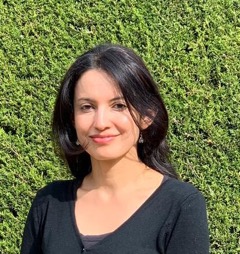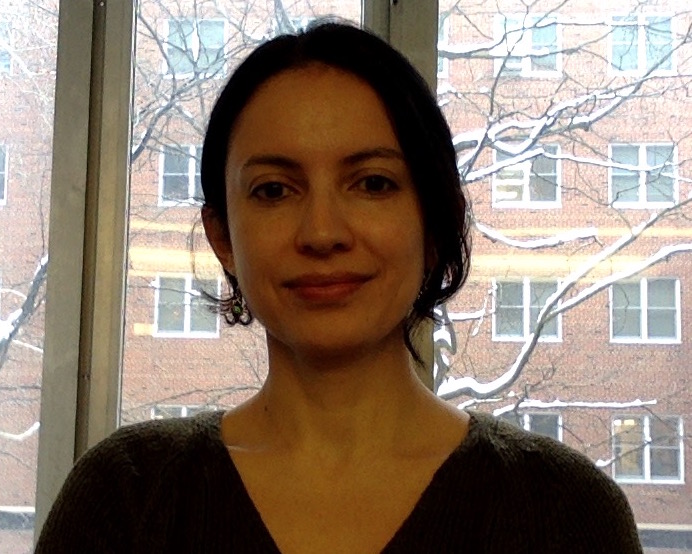We’re taking time over the following weeks to get to know the members of the GSA’s Early Career Scientist Committees. Join us every week to learn more about our 2019 early career scientist advocates.

Bernarda Calla
Career Development Subcommittee
University of Illinois at Urbana-Champaign
Research Interest
One of the main mechanisms used by plants to ward off enemies is the production of secondary metabolites, also known as allelochemicals, which act as a deterrent or are toxic to insects. Insects, on the other hand, have the ability to detoxify some or several of these plant chemicals. It has been theorized that, across evolutionary timeframes, these reciprocal interactions have created an evolutionary arms-race that triggered the outburst of terrestrial biodiversity. Life in the form we know today is sustained by this biodiversity in a finely tuned equilibrium. My main research interest lies in delineating, with greater specificity, the evolutionary processes of adaptation in plants and in their associated organisms. At the broader level, my research could help answer questions about organisms’ adaptation to pressures like agriculture and climate change.
To better understand the relationships between plants and their coevolved organisms, my research focuses in the cytochrome P450 gene family and its evolution. In plants, P450s enzymes are part of several pathways leading to the production of secondary metabolites. In insects, P450s are responsible for the metabolization of endogenous compounds as well as detoxification of allelochemicals and other xenobiotics, including man-made pesticides. I use genome sequencing and assembly to elucidate the number and classes of P450 genes across Lepidoptera insects and their plant hosts. I utilize transcriptomics to identify the expression patterns of these P450s in response to plant allelochemicals in insects and in response to insect feeding in plants. Finding and annotating the genes and expressing them in heterologous systems helps me determine their specific function and how they relate to the organism function and adaptive capacity in an ecological and evolutionary context. I also aid the functional search by utilizing computer molecular homology modelling, where I predict the final protein conformation and substrates that a given P450 would likely bind.
As a PhD-trained scientist, you have many career options. What career paths interest you the most?
I am interested in a career that provides the opportunity to continue conducting research. I’m eager to solve problems and answer questions about aspects of environment, agriculture, and food security. My wide interests within biology are complemented by my diverse technical skills, which range from bench work to coding. I enjoy developing tools and protocols and also analyzing big data. I also find the intellectual and creative processes involved in producing and putting out a manuscript enjoyable.
One of the most rewarding parts of my professional experience has been coaching students and technicians. I would like to continue mentoring and training students and staff throughout my career. These aspects of my professional background combined with my multidisciplinary approach to research make a position leading my own research lab an ideal fit.
In addition to your research, how else do you want to advance the scientific enterprise?
While our society is evolving towards inclusiveness, it is evident that there is still a lot of progress to be made to push the deeply-rooted boundaries that prevent specific groups from taking part in scientific research. Those boundaries start with limited educational opportunities for children from underserved populations and continue well into restricted access to opportunities tailored for highly-skilled and highly-educated groups due to historical policies and practices. To advance the scientific enterprise, we must promote change that leads to greater inclusivity. A first step is to bring opportunities closer to those who otherwise would not have access to them.
During my graduate program, I mentored high-school students in a program for traditionally underserved groups. I have proudly seen my mentees continuing careers in sciences as college students and then as graduate students. I look forward to continuing introducing science careers to young students and early career scientists while also advocating for more positions.
As a leader within the Genetics Society of America, what do you hope to accomplish?
So far, one of the best experiences I had within a scientific society was at the Genetics Society of America, and I am very excited about the opportunity to contribute back. The GSA stands out from other scientific associations in that it is very active in promoting activities and opportunities for career growth. After joining the GSA about a year ago, I found myself visiting the wealth of information and resources put together for early career scientists, and this has been extremely useful for informing my traditional thinking of scientific career paths. Now that I am part of the Career Development Subcommittee in a leadership role, I will take part in bringing up and putting together information on career stories to inspire other scientists. Ultimately I hope to make a difference in the life of at least one scientist by helping to open his or her eyes to a career opportunity that aligns with his or her interest.
Previous Leadership Experience
- Mentor — Research Apprentice Program, University of Illinois at Urbana-Champaign
- Mentor of undergraduate and graduate students, University of Illinois and University of Hawaii at Hilo
- Green Lab Ideas Initiator — Environmental Management System Committee, USDA/ARS
Connect with Bernarda Calla on LinkedIn.













